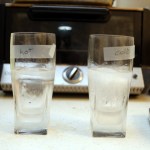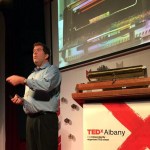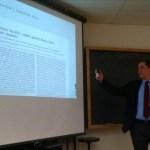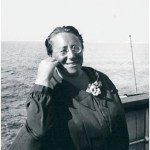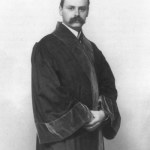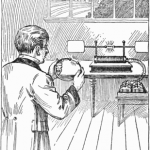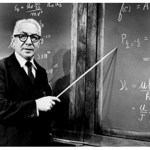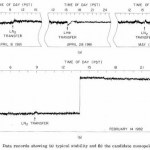History of Science
Periodically, some scientific celebrity from the physical sciences-- Neil deGrasse Tyson or Stephen Hawking, say-- will say something dismissive about philosophy, and kick off a big rush of articles about how dumb their remarks are, how important philosophy is, and so on. Given that this happens on a regular basis, you might wonder why it is that prominent physicists keep saying snide things about philosophy. But never fear, the New York Times is here to help, with an op-ed by James Blachowicz, an emeritus philosopher from Loyola, grandly titled There Is No Scientific Methods.
It's actually…
One of my favorite modern tales of scientific discovery is the Mpemba Effect, named after Erasto Mpemba, a schoolboy in Tanzania who noticed while making ice cream that hot mix put in the freezer solidified faster than cold. This counter-intuitive result has been replicated a bunch of times, and physicists and chemists continue to debate the reason for it.
It was bitterly cold this weekend, dipping down into the negative Fahrenheit, which wasn't great for, you know, leaving the house, but did provide an opportunity to test the Mpemba Effect. Because when the icy winds of winter blow, that's a…
A couple of weeks ago, I gave a talk at TEDxAlbany on how quantum physics manifests in everyday life. I posted the approximate text back then, but TEDx has now put up the video:
So, if you've been wondering what it sounded like live, well, now you can see...
So, yesterday was my big TEDxAlbany talk. I was the first speaker scheduled, probably because I gave them the title "The Exotic Physics of an Ordinary Morning," so it seemed appropriate to have me talking while people were still eating breakfast...
The abstract I wrote when I did the proposal mentions both quantum physics and relativity, but when I actually wrote the talk, that made for a really awkward transition, so it's all quantum, all the time. I cover quite a bit of ground-- the no-animation-effects version of the slides is 42 slides and Word has it as just over 2500 words written out…
Somebody in my social media feeds passed along a link to this interview with Berkeley professor Daniel Boyarin about "the humanities," at NPR's science-y blog. This is, of course, relevant to my interests, but sadly, but while it's a short piece, it contains a lot to hate.
For one thing, after the dismissive one-two of "so-called 'scientific methods'" (Scare quotes! "So-called"! Two great tastes that taste great together!) in the process of trying to re-brand "the humanities" as "the human sciences," Boyarin offers the following on methodology:
The primary method for the study of humans…
I spent the last few days in Ontario, attending the Convergence meeting at the Perimeter Institute. This brought a bunch of Perimeter alumni and other big names together for a series of talks and discussions about the current state and future course of physics.
My role at this was basically to impersonate a journalist, and I had a MEDIA credential to prove it. I did a series of posts at Forbes about different aspects of the meeting:
-- The Laser Cavity was Flooded: a revisiting of the idea of True Lab Stories, which was a loose series of funny disaster tales from the early days of…
I'm massively short on sleep today, and wasn't going to blog until I saw somebody on Facebook mention that June 5th 1995 is the date of record for the first Bose-Einstein condensate at JILA in Boulder. I couldn't let that pass, so I wrote it up for Forbes:
Twenty years ago, in the summer of 1995, I was a young grad student having just finished my second year at Maryland, and one morning I packed into the conference room at the National Institute of Standards and Technology (NIST) in Gaithersburg (where I worked in the group of Bill Phillips) with most of the rest of the Atomic Physics…
I've been sort of falling down on my obligation to promote myself-- I've written two blog posts for Forbes this week, and forgotten to post about them here. The first is a thing about philosophy in physics, and how Einstein illustrates both the good and bad aspects of a philosophical approach.
The second is a bit on the listicle side, looking at some types of diagrams that physicists draw when talking about physics. It's prompted by a ZapperZ post noting that scientists talking about science always draw pictures, but other subjects get by with just talking.
These are both quickly-dashed-off…
A month or so back, when I went to Vanderbilt to give a talk, I met Robert Scherrer, the department chair down there, who mentioned he was starting a blog soon. That blog is Cosmic Yarns, and has now been live for a while, but I've been too busy to do a proper link. He's using it to look at the science of science fiction, and has a bunch of nice posts up, including a good explanation of why you don't need to worry about giant ants:
Has this ever happened to you? While you are enjoying a relaxing picnic in the New Mexican desert, your lunch is overrun by ants: not ordinary ants, but 12-foot…
As mentioned over the weekend, I gave a talk last week for UCALL, part of a series on "The Radical Early 20th Century." I talked about how relativity is often perceived as revolutionary, but isn't really, while Einstein's really revolutionary 1905 paper is often overlooked. And, having put the time into thinking about the subject, I turned the basic theme into a new blog post over at Forbes:
Albert Einstein is easily one of the most recognizable people in history, and everybody thinks they know why. He’s the guy who, in 1905, completely revolutionized physics, overthrowing the prior order…
Back when we went to London for Worldcon (and then I went to Sweden for a workshop), I bought a smartphone in Heathrow thinking I could sell it back when I left. That turned out not to work the way we thought, but it's served me well ever since as an e-reader. It can't connect to the local cell network, but I can download stuff via wi-fi, and it's small enough to hold in one hand, and back-lit, which makes it nice for reading in bed and on planes.
The lack of a cell connection, though, means it's just running on its onboard clock, so has gotten out of synch with my US phone. But even that is…
It's always a pleasure to see former students doing well, and to that end, we invited one of my former thesis students, Mike Mastroianni, class of 2007, to give a colloquium talk last week in the department. Mike went to physics grad school for a couple of years after graduation, but decided he was more interested in education issues, and is now in the process of writing his dissertation (to be defended in a few weeks) in a Curriculum and Instruction program at the University at Albany.
He gave a really interesting talk on his thesis work, looking at the evolution of gender ratios in STEM…
Kate's a big consumer of audio books, but I've never been able to listen to them. About five minutes in, I doze right off, every time. However, I know there are a lot of folks like Kate who love audio books and listen to them while commuting, so I'm very happy to announce that Audible is now selling an audio edition of Eureka.
This is the first of my books to get an audio edition, which is cool-- we actually sold audio rights to the first one, but I guess after they paid for it, they discovered that it has a whole bunch of pictures that are kind of integral to the book. At least, I'm guessing…
There's a new-ish book review podcast covering pop-science books, BookLab, hosted by Dan Falk and Amanda Gefter, and their latest episode includes my Eureka as the third of three books being discussed (a bit more than 40 minutes in, though their discussion of the other books is also interesting...).
It's sort of an odd experience listening to other people talking about my book; most of the audio I've heard about it is listening to my own interviews, where I'm actively participating (I recorded another radio interview yesterday; not sure when it will air, but I'll post a link). Happily, they…
(When I launched the Advent Calendar of Science Stories series back in December, I had a few things in mind, but wasn’t sure I’d get through 24 days. In the end, I had more than enough material, and in fact didn’t end up using a few of my original ideas. So I’ll do a few additional posts, on an occasional basis, to use up a bit more of the leftover bits from Eureka: Discovering Your Inner Scientist…)
While Eureka is built around stories, it's really a book about the process of science, using those stories to highlight particular aspects of the scientific process. The hope is that making the…
No, not the little cover .jpg that I use as the "featured image" to tag these posts promoting Eureka. The post title refers to the Big Picture Science radio show from the SETI insitute. I'm one of the people interviewed in the latest episode, Maria Konnikova (author of Mastermind) and Louis Liebenberg.
This is another interview that was recorded remotely down at WAMC in Albany. They pushed back on my stock answers a little more than usual, which in one sense was fun, but was also pretty exhausting, as I was at the lowest point of the cold I'm just getting over now. I went home right after it…
(When I launched the Advent Calendar of Science Stories series back in December, I had a few things in mind, but wasn’t sure I’d get through 24 days. In the end, I had more than enough material, and in fact didn’t end up using a few of my original ideas. So I’ll do a few additional posts, on an occasional basis, to use up a bit more of the leftover bits from Eureka: Discovering Your Inner Scientist…)
While we mostly think of science being done in comfortable institutes if not gleaming laboratories, one of the most impressive and inspiring things about science is that people can and do carry…
(When I launched the Advent Calendar of Science Stories series back in December, I had a few things in mind, but wasn't sure I'd get through 24 days. In the end, I had more than enough material, and in fact didn't end up using a few of my original ideas. So I'll do a few additional posts, on an occasional basis, to use up a bit more of the leftover bits from Eureka: Discovering Your Inner Scientist...)
One of the things I was reacting against in writing Eureka is the popular idea of scientists as a sort of unworldly elite, off doing their ivory-tower idealized thing without worrying about…
Over at Curious Wavefunction, Ashutosh Jogalekar offers a list of great surprising results in physics. This is fairly comprehensive, but leaves out one of my favorites, which is the discovery of the muon. Muons are particles like electrons, but a couple hundred times heavier. When they were first detected in cosmic ray traces in 1936, physicists briefly thought they were the mesons that Hideki Yukawa had predicted as the carriers of the strong nuclear force. It quickly became clear, though, that while the mass was about right to be Yukawa's particle, the muon didn't have anything to do with…
(When I launched the Advent Calendar of Science Stories series back in December, I had a few things in mind, but wasn't sure I'd get through 24 days. In the end, I had more than enough material, and in fact didn't end up using a few of my original ideas. So I'll do a few additional posts, on an occasional basis, to use up a bit more of the leftover bits from Eureka: Discovering Your Inner Scientist...)
One of the tricky things about writing this book was that I didn't just need stories from the history of science, but stories that fit a particular pattern. The point of the book, after all, is…
